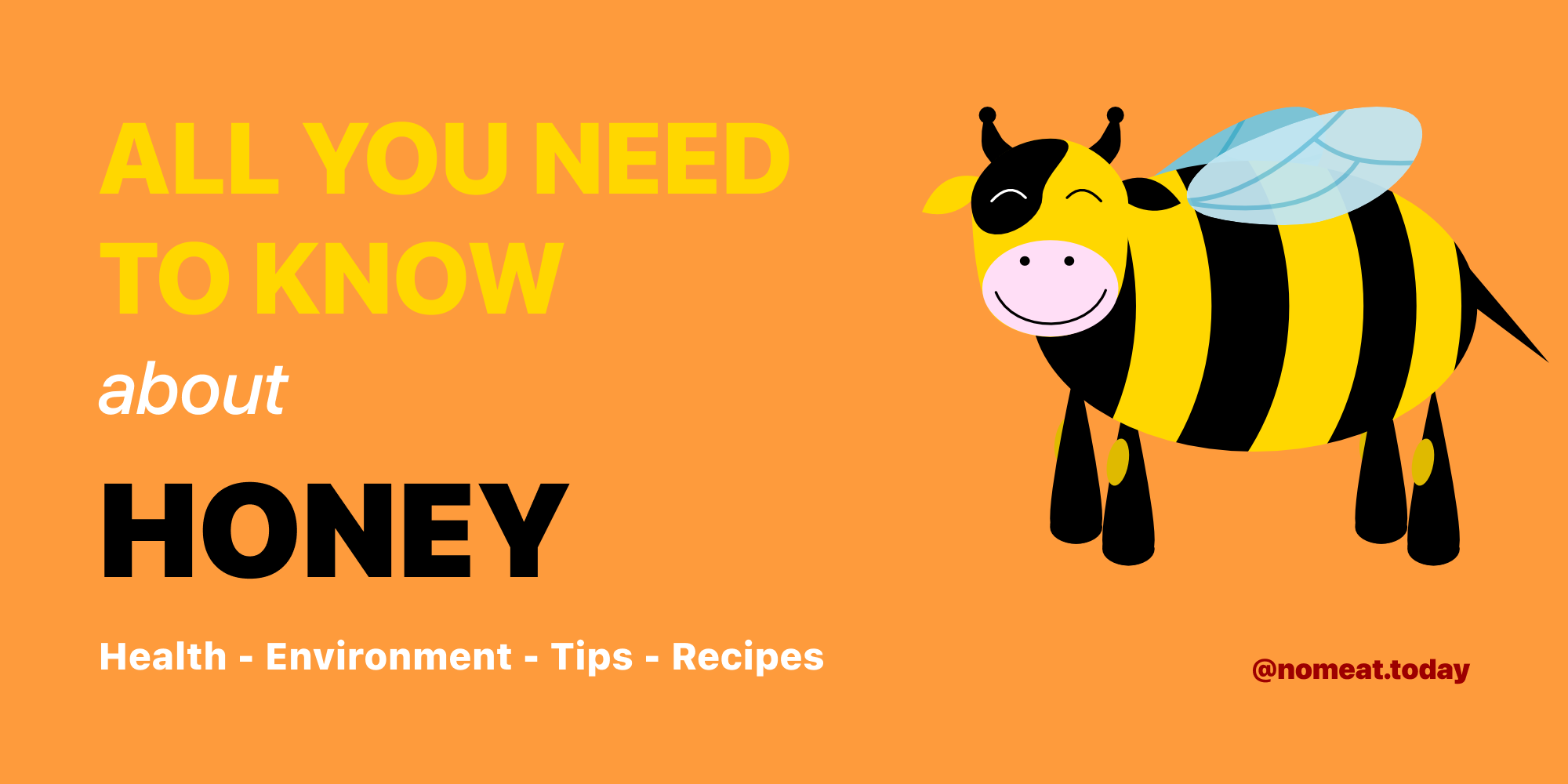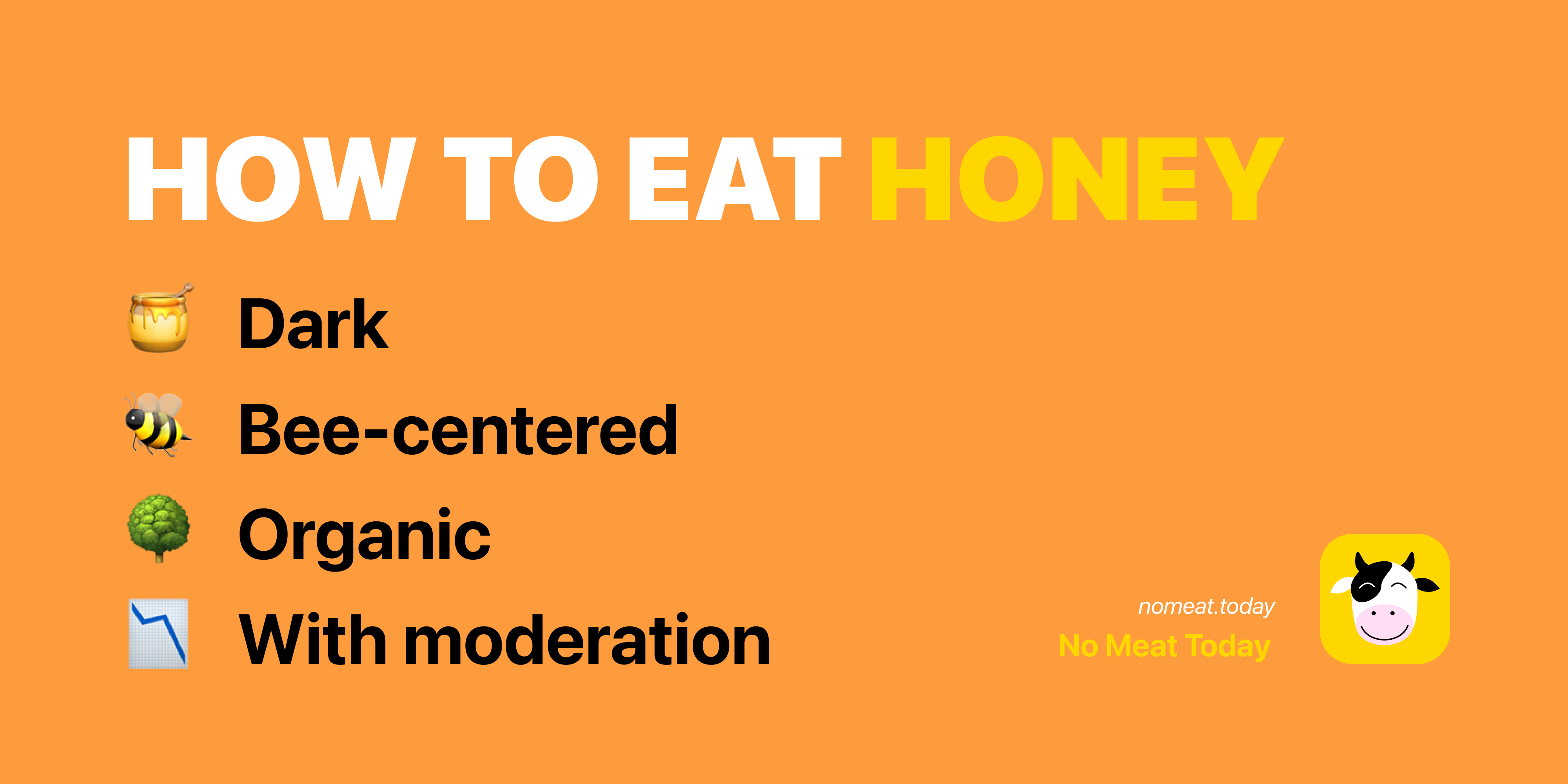All you need to know about honey

- "Hey honey, wanna go on a honeymoon!"
- "Are you asking because I'm sweet, or because I'm good for your health?"
- "Both! And you're also quite good for the environment!"
- "Alright then, but first: tell me more about me…"
TL;DR

Basics
When did honey become common food for us?
The first information we have on honey dates back to at least 8,000 years ago in Spain. The Mayans also made honey. But honeybees are far older than man's historical record, written or otherwise. Homo sapiens evolved 50,000 years ago; bees were making honey at least 40 million years before that.
How is honey made?
Bees collect flower nectar which gets stored in the honeycomb. The nectar becomes liquid thanks to the evaporation caused by the design of the honeycomb and the constant fanning of the bees' wings. The hive will produce more than it needs.
Beekeepers harvest it by collecting the honeycomb frames and scraping off the wax capping. Once the caps are removed, the frames are placed in an extractor, a centrifuge that spins the frames, forcing honey out of the comb.
Where is it produced?
All countries produce honey. But the largest producers are China (24% of total production), Turkey (6%), Argentina (4%), and Iran (4%).
Is honey vegan-friendly?
No. But, there are ways to produce it in more acceptable manner for animal lovers.
Veganism seeks to exclude all forms of exploitation of animals, and commercial production of honey easily slips into an unethical practice:
- replacing honey with a sugar substitute that
- clipping the wings of the Queen bees to prevent them from leaving the hive
- keeping costs down by culling hives after the harvest
- selective breeding designed to increase productivity regardless of side effects (disease susceptibility, large-scale die-offs…) which can have effects on other pollinators
- harvesting honey during fall, leading to bees dying from starvation or cold
- oversized hives making bees work to death
That being said, there are efforts encouraging beekeepers to adopt a bee-centered approach (and possibly symbiotic?), such as the Natural Beekeeping Trust.
Is honey good for my health?
👍 Benefits
- Rich source of antioxidants
- Cough suppressant
- Treats a sore throat
- Treats burns and wound healing
- Improves heart heart
- Helps to reduce blood pressure
- Strengthens your immune system
- Prevents neurological disease. Studies suggest that honey might offer antidepressants, anticonvulsants, and anti-anxiety benefits. In some studies, honey has been shown to help prevent memory disorders.
Results might vary because there are no standardized methods for producing honey or verifying its quality.
👎 Drawbacks
- Allergies. Those who are prone to allergies should be careful about eating honey. Although honey allergies are rare, they do occur. It could be due to bee pollen in the honey.
- Stomach problems and bloating. Eating too much honey can have an adverse effect on our digestive system. It could lead to gas, bloating and stomach problems. Too much honey can even lead to stomach crampings, diarrhea, and even constipation.
- Not at all recommended for diabetic patients. Honey in higher amounts is not at all recommended for diabetic patients or even people who possess a risk of developing diabetes. Honey increases your blood sugar level because of the high amount of sugar present in it. On the other hand, honey does not contain any fiber and this lack of fiber participate further in increasing your blood sugar levels as the absorption of the sugar into the bloodstream becomes quicker.
- May lead to overweight. Honey is generally preferred by people who are on their weight loss journey. But you should always eat honey with warm water or lemon juice to achieve weight loss.
- Causes teeth cavities. Too much honey makes your teeth weaker and erodes the enamel of the teeth. Honey is a bit acidic in nature and may raise the chances of developing dental cavities.
- Not recommended for infants and pregnant women. Even a small amount of honey can cause adverse effects on an infant’s health.
Which honey should you eat?
✅ Manuka Honey is usually considered to be the healthiest honey. Manuka honey has the biggest antiviral, antifungal, antibacterial, anti-inflammatory, and antioxidant benefits (1). Keep in mind that it comes from Australia and New Zealand, so depending on where you are, transportation could damage your environmental impact.
✅ Dark, Unfiltered Honeys, Like Raw Buckwheat Honey, Alfalfa Honey, Eucalyptus Honey, and Jamun Honey. Honeys that are darker in color are likely to have more micronutrients, healthy compounds, and antioxidants.
❌ Clear, Filtered Honey is therefore the worse honey. Healthy micronutrients have been filtered out and possibly replaced with crappy filler ingredients.
Honey 🍯 vs agave syrup 🌵 vs maple sirup 🍁 vs sugar 🍬
Quick summary
- 100g of honey = 304 calories
- 100g of agave syrup = 310 calories
- 100g of maple syrup = 260 calories
- 100g of sugar = 387 calories
All of them have a high sugar level, so consume them in moderation.
Agave syrup 🌵
Extracted from cactus sap, agave is trendy in sugar alternatives. Depending on how it is extracted it could contain even more sugar than regular sugar. In its natural state, it is full of magnesium, potassium, iron, and calcium. However, it's refining at high temperatures causes it to lose a large part of its mineral salts.
Maple syrup 🍁
Mainly produced in Québec, Canada, maple syrup comes from maple (pretty easy). It has several minerals and health benefits. The "healthiest" sugar alternative.
Sugar 🍬
Sucrose is concentrated in sugarcane and sugar beet making them ideal for efficient commercial extraction to make refined sugar. It has the highest level of calories at 100g and is added to a lot of manufactured food products such as pasta, juices, yogurts...
Is it good for longevity?
A study (2) split two cohorts. One would eat honey the other one wouldn't. All-cause mortality during 25 years of follow-up was considerably lower in the cohort who had consumed honey. Because of the small number of subjects and deaths in this study, further data from other large cohorts will be required before any effect on mortality and other health effects of honey consumption can be adequately evaluated.
Is honey good or bad for the environment?
When considering the environmental impact of honey, there are several factors to consider.
We have chosen to look at this from 4 angles: greenhouse gas emissions, water use, land use, and pesticides.
Greenhouse gas emissions
You can check the sources for more information, but this should give you an idea of where honey stands, especially compared to other foods.
🍯 Honey
- The United States. Between 0.67 to 0.92 kg CO2e (3) 🥇
- Argentina. Between 2.5 and 2.7kg CO2e (4)
🌾 Sugar Cane
- Brazil. Between 4.5 and 5.2kg CO2e (5) 🥇
- Indonesia. Between 8.6 and 14.2kg CO2e (6)
🐂 Beef
- Indonesia. Between 225 and 365kg CO2e (7)
- France. Between 42 and 55kg CO2e (8)
- Ireland. Between 36 and 46kg CO2e (9) 🥇
🍏 Apple
- France. Between 0.2 and 0.6kg CO2e (10) 🥇
- New Zealand. Between 0.3 and 1.2kg CO2e (11)
💦 Water use (12)
- 🍯 Honey: Bees go find natural water sources. Environmental impact is therefore very low. It takes 36L of water to make 4.5L of honey
- 🌾 Sugar Cane: 620L per kilogram of food
- 🐂 Beef (beef herd): 1451L
- 🐑 Lamb & mutton: 1803L
- 🍏 Apples: 180L
🌳 Land use (13)
- 🍯 Honey: no evidence found. If you find some, please reach out!
- 🌾 Sugar Cane: 2.04m² per kilogram of food
- 🐂 Beef (beef herd): 326m²
- 🐑 Lamb & Mutton: 369m²
- 🍏 Apples 0.63m²
Pesticides
Neonicotinoid insecticides are massively used since the 1990s, originally developed by Shell and Bayer. It impacts hives directly, and for example, 300,000 hives disappear each year in France. Hives' mortality has increased from 5% to 30% in 30 years. Hives produce less honey and it has divided French production by 2.
According to a study led by Neuchâtel University (14), 3/4 of honey around the world is contaminated by insecticides. Some of them are even banned already in their respective countries. Organic honeys had the lowest traces (if any) of insecticides, which is why you should:
Tips when cooking it
✅ Honey helps baked goods stay fresh and moist longer. It also gives any baked creation a warm, golden color.
✅ Reduce the oven temperature by 25 degrees to prevent over-browning.
✅ Because of its high fructose content, honey has a higher sweetening power than sugar. This means you can use less honey than you would use sugar to achieve the desired sweetness.
Recipes with honey
Sure, honey can be eaten right from a spoon - although honey connoisseurs use a honey dipper.
But if you want to try something new, here are 5 recipes selected for you.

- 🤌 Classic: https://cookieandkate.com/honey-almond-granola/
- 🤯 Surprising: https://tutti-dolci.com/baklava-cookie-bars/
- 🛋 Comfort: https://moonandspoonandyum.com/honey-chocolates/
- 🏃 In a hurry: https://www.pinterest.fr/pin/23292123045705031/
- 🧑🍳 Michelin Star: https://www.greatbritishchefs.com/recipes/pear-manuka-honey-tart-recipe
Conclusion
Honey is a great natural product both for the environment and for your health. The environmental impact is pretty low and even lower than sugar. Every country produces honey, so transportation can be avoided. On the health side, honey, as well as maple syrup or agave syrup is a great alternative to sugar. And you can avoid the use of insecticides by eating organic honey. Great for your health and for bees.
Consume organic honey to replace sugar, but overall reduce your consumption of sweet products!
If you care about animals, health or the environment, reducing your meat consumption is one of the main things you can do for them.But it's hard to do it alone! No Meat Today can help you on your journey/
Sources
️⚠️ Disclaimer: if you discover new reliable sources that could improve our post, feel free to reach out to us [email protected]
- David Friedman, Food Sanity: How to Eat in a World of Fads and Fiction
- Cooper RA, Fehily AM, Pickering JE, Erusalimsky JD, Elwood PC. Honey, health and longevity. Curr Aging Sci. 2010 Dec;3(3):239-41. doi: 10.2174/1874609811003030239. PMID: 20735343.
- Kendal et al.
- Mujica et al.
- Macedo et al. (2004) de Oliveira Bordonal et al. (2013)
- Frieden et al. (2011) Khatiwada et al. (2016)
- Widi et al. (2015)
- Nguyen et al. (2013b)
- Casey and Holden (2006a); Blonk et al. (2008)
- Koch and Salou (2015)
- Milà i Canals (2003)
- Poore, J., & Nemecek, T. (2018). Reducing food’s environmental impacts through producers and consumers. Science, 360(6392), 987-992
- Poore, J., & Nemecek, T. (2018). Reducing food’s environmental impacts through producers and consumers.
- https://www.unine.ch/unine/home/pour-les-medias/communiques-de-presse/stabilite-preoccupante-de-pestic.html
- https://www.dummies.com/article/home-auto-hobbies/food-drink/ingredients/tips-cooking-honey-236218/
- https://www.consoglobe.com/toxicite-des-neonicotinoides-miels-contamines-cg
- https://honey.com/about-honey/how-honey-is-made
- https://blog.lafourche.fr/sirop-agave-alternative-sucre
- Country-specific effects of neonicotinoid pesticides on honey bees and wild bees
- https://www.webmd.com/diet/honey-health-benefits
- https://melmagazine.com/en-us/story/ranking-honeys-by-how-healthy-they-are

